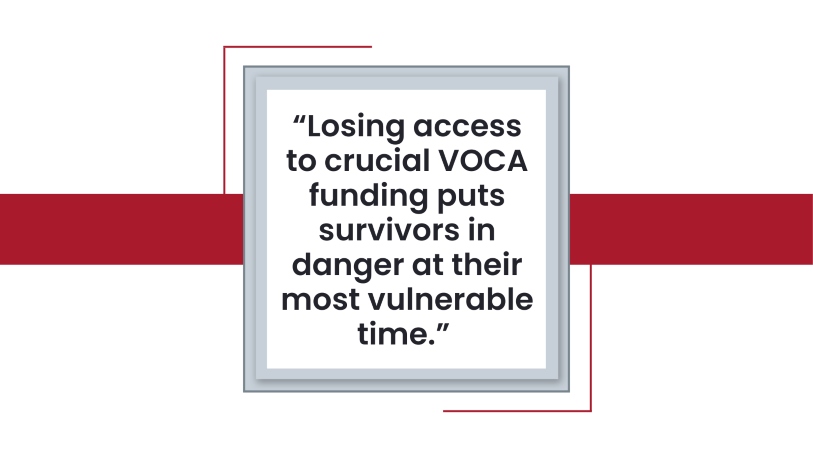Note: The following piece was written by Terri Poore, RALIANCE’s Policy Director.
Budget discussions in Washington occur every day, but sometimes the negative impact of funding cuts gets lost among the balance sheets. One in five women in the United States experience rape in their lifetime, while nearly a quarter of American men experience some form of sexual assault. One in three of those female victims are faced with this experience between the ages of 11 and 17, while the same is true of one in four male victims. Nearly 40% of women have experienced sexual harassment at work, as have 14% of men.
Sexual harassment, misconduct, and abuse is a widespread societal issue. Unfortunately, critical funding to support the organizations that help survivors has not kept pace.
The Victims of Crime Act’s (VOCA) Crime Victims Fund (CVF), which supports nearly 6,500 direct service organizations, such as domestic violence shelters, rape crisis centers, and other sexual assault service providers, experienced a $700 million (40%) cut in FY 2024. These cuts come at a time when demand for sexual assault services is surging, with a 70% increase in requests for services.
Losing access to crucial VOCA funding puts survivors in danger at their most vulnerable time – support programs will lose staff, support groups and counseling services will decrease, and an already underinformed public will become even less so. High demand will be met with decreased supply, and survivors and their communities will suffer.
Looking at on-the-ground examples of this nationwide, the impact is clear. Without VOCA funding, the Connecticut statewide domestic violence hotline would be completely eliminated, as it receives 100% of its funding via the program. In Iowa, more than 22,000 victims would lose access to crucial services, with cuts disproportionately affecting rural communities whose access to assistance is already compromised. These are just two examples of ripple effects that will be felt across the U.S. if these funding cuts remain.
To put it in economic terms: a 2017 American Journal of Preventive Medicine study estimated that the lifetime cost of rape to a victim is more than $122,000. Considering how many Americans experience rape and sexual assault over the course of a lifetime, the proposed cuts to VOCA’s CVF are a small drop in the ocean compared to the burden survivors are forced to shoulder.
These negative consequences also extend to communities and the workplace. In one study, 50% of rape victims lost or were forced to quit their jobs in the year following their rapes because of their trauma. Sexual assault service providers and other advocates help employers by providing free, confidential care, support, and resources in their communities. Budget cuts to these service organizations are not only a threat to community resources, but also a threat to the businesses, employers, and organizations in those communities. Even workplaces with EAPs and comprehensive benefits packages must recognize their workforce will suffer when local trauma-informed, survivor-centered service providers who provide free, confidential support are forced by lack of funding to close their doors.
Recently, there’s been important work toward creating safer workplaces at the federal level, and we’d like to see the momentum continue. If we truly want workplaces and communities to be safer, there needs to be adequate funding for VOCA and the organizations that provide critical services for survivors of sexual assault. Survivors and our society cannot afford to lose this critical social safety net – both from a business and economic perspective, and from a moral one.
Restoration of this essential funding should happen as soon as possible. RALIANCE supports the bipartisan Crime Victims Fund Stabilization Act as one means of reinstating this funding, but there’s more to be done. President Biden and Congress have an opportunity to make this right in the FY25 budget. This is about more than just dollar amounts – this funding gives survivors the ability to get the support they need to heal from their trauma and be contributing members of society and the workforce.
With the support of employers and Congress restoring VOCA funding, these critical services will once again be made available to survivors. With that, we’ll be that much closer to a better future – one where survivors receive the support they need, and organizational cultures are free from sexual harassment, misconduct, and abuse.
RALIANCE is a trusted adviser for organizations committed to building cultures that are safe, equitable, and respectful. RALIANCE offers unparalleled expertise in serving survivors of sexual harassment, misconduct, and abuse which drives our mission to help organizations across sectors create inclusive environments for all. For more information, please visit www.RALIANCE.org.

